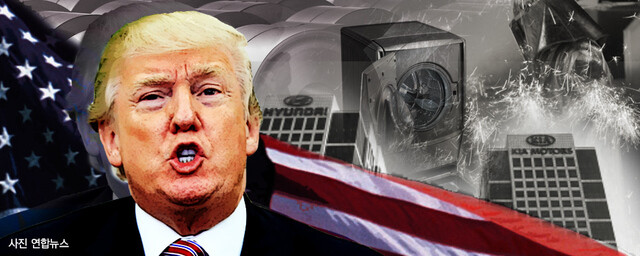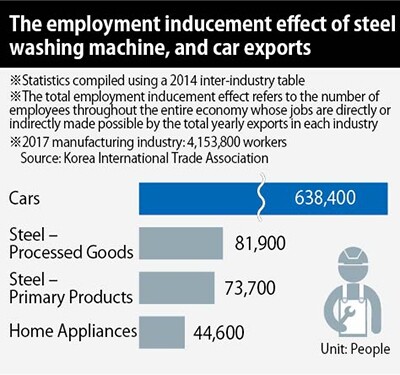hankyoreh
Links to other country sites 다른 나라 사이트 링크
[News Analysis] Trump’s trade measures threaten jobs of South Korean workers

Amid a daily onslaught of trade pressure from US President Donald Trump across a full range of South Korean industries – including steel, washing machines and automobiles – South Korean workers in export industries to the US find themselves forced to combat Trump, rather than their individual employers, in order to save their jobs. In effect, Trump has become a “phantom negotiating counterpart” for these workers.
During a meeting with reporters on Feb. 19, South Korean Minister of Trade, Industry and Energy Paik Un-gyu brought up the US Commerce Department’s report on steel’s impact on security based on Section 232 of the Trade Expansion Act. “[The US] claims this is about security, but there’s an economic side, too. The US intends to regulate the 13.3 million tons of steel imported into the American market each year to increase the overall utilization rate of the US steel industry from the current level of 72% to 80%,” Paik said.
The Commerce Department’s report proposes regulating imports of nearly all steel products, covering more than 600 types, including cold-rolled and hot-rolled steel. Security appears to be just an excuse, and Trump’s actual goal is to protect US steel companies and the jobs of workers given the oversupply of steel in the global market.

The oversupply of global steel amounts to about 760 million tons, according to an estimate by the Korea Iron and Steel Association. “The US Commerce Secretary said during a press conference that one of the important elements considered when the US was selecting the 12 countries, including South Korea, whose steel imports it would regulate was the rate of increase of their surplus production capacity,” said South Korean Deputy Minister for Trade Kang Sung-chun. In effect, the US is using Section 232 of the Trade Expansion Act (a law that was passed way back in 1962) against South Korea and other countries with the ulterior motivation of protecting the jobs of American workers in the steel industry from the problem of overproduction, which is the joint responsibility of the global steel industry, and to create new jobs as well.
“Trump seems to be trying to revive the faded legend of Andrew Carnegie, the King of Steel. The US is currently threatening South Korean jobs by imposing high import tariffs of nearly 60% on more than 20 South Korean steel products and imposing countervailing duties because of South Korean government subsidies on steel,” said Song Jae-bin, vice chairman of the Korea Iron and Steel Association.
US trade protectionism under the premise of “America First”
As Trump engages in sweeping commercial retribution under the banner of “America First,” a new commercial relationship between South Korea and the US is forming in which South Korean workers in export industries focused on the US have to deal with Trump. The US’s activation of a safeguard on washing machines has already caused Samsung Electronics and LG Electronics to build and operate new washing machine factories in the US. The GM corporate headquarters in the US and Trump are threatening to shut down a factory in Korea and relocate it to Mexico or Detroit. Even the Section 232 steel report is aimed at pressuring South Korea to reduce its overproduction of steel.
“We are enraged to see the GM abruptly shut down a factory and shift the responsibility for the deficit to the workers, simply for stockholders’ profit,” said the GM Korea branch of the Korean Metal Workers' Union during a press conference on Feb. 20.
Trump’s pressure is threatening South Korean jobs. According to the Korea International Trade Association (KITA), 5.9 and 4.6 jobs are supported by every US$1 million of processed and primary steel products that are exported, which means that steel imports were directly and indirectly behind 155,000 jobs last year. South Korean steel exports to the US last year were worth US$3.26 billion, which amounts to around 9.5% of the total value of steel exports.
A rough calculation suggests that blocking exports to the US would immediately jeopardize the employment of over 15,000 people. As of 2016, there are 94 categories altogether in which South Korea is the leading exporter in the US market, and 20 of these, or 21.3%, are steel products.
Furthermore, exports of automobiles and household electric appliances such as washing machines supported 638,000 and 44,000 jobs, respectively, last year. The employment inducement effect for every US$1 million of exports is higher in these two sectors (10 jobs for household electric appliances and 8.6 for automobiles) than the average across the entire manufacturing sector (7.4). Last year, KITA estimated that all the exports (worth US$56.02 billion) of South Korea’s manufacturing sector were directly and indirectly responsible for 4.15 million jobs in the South Korean economy.
Some analysts believe that South Korean President Moon Jae-in’s emphasis the day before on aggressively countering the US’s unfair protectionist assault reflects an urgent sense that the country cannot afford to give any more ground to the US prioritizing its own workers. “I understand that [the imposition of tariffs under Section 232] is based on the perspective of the US economy and industry and designed to protect the steel industry by suppressing imports. We will address trade issues with our major trading partners, including the US, from the perspective of securing the national interest [in areas such as jobs],” said Blue House Senior Secretary for Economic Affairs Hong Jang-pyo during a briefing at the Blue House on Feb. 20.
“We regard [the Section 232 steel report] as a policy by which Trump hopes to appeal to the middle-class white workers who constitute his political support base to help his party retain power in the midterm elections this November. We don’t think that [Trump’s protectionist offensive] will end here; he has no choice but to keep expanding it to other fronts,” said a senior official at the Ministry of Trade, Industry and Energy.
By Cho Kye-wan, staff reporter
Please direct questions or comments to [english@hani.co.kr]

Editorial・opinion
![[Column] Season 2 of special prosecutor probe may be coming to Korea soon [Column] Season 2 of special prosecutor probe may be coming to Korea soon](https://flexible.img.hani.co.kr/flexible/normal/500/300/imgdb/original/2024/0426/3317141030699447.jpg) [Column] Season 2 of special prosecutor probe may be coming to Korea soon
[Column] Season 2 of special prosecutor probe may be coming to Korea soon![[Column] Park Geun-hye déjà vu in Yoon Suk-yeol [Column] Park Geun-hye déjà vu in Yoon Suk-yeol](https://flexible.img.hani.co.kr/flexible/normal/500/300/imgdb/original/2024/0424/651713945113788.jpg) [Column] Park Geun-hye déjà vu in Yoon Suk-yeol
[Column] Park Geun-hye déjà vu in Yoon Suk-yeol- [Editorial] New weight of N. Korea’s nuclear threats makes dialogue all the more urgent
- [Guest essay] The real reason Korea’s new right wants to dub Rhee a founding father
- [Column] ‘Choson’: Is it time we start referring to N. Korea in its own terms?
- [Editorial] Japan’s rewriting of history with Korea has gone too far
- [Column] The president’s questionable capacity for dialogue
- [Column] Are chaebol firms just pizza pies for families to divvy up as they please?
- [Column] Has Korea, too, crossed the Rubicon on China?
- [Correspondent’s column] In Japan’s alliance with US, echoes of its past alliances with UK
Most viewed articles
- 1[Column] Season 2 of special prosecutor probe may be coming to Korea soon
- 2‘We must say no’: Seoul defense chief on Korean, USFK involvement in hypothetical Taiwan crisis
- 3N. Korean delegation’s trip to Iran shows how Pyongyang is leveraging ties with Moscow
- 4Amnesty notes ‘erosion’ of freedom of expression in Korea in annual human rights report
- 5[Editorial] Korea’s surprise Q1 growth requires objective assessment, not blind fanfare
- 6Division commander ordered troops to enter raging flood waters before Marine died, survivor says
- 7[Reportage] On US campuses, student risk arrest as they call for divestment from Israel
- 8Korea sees more deaths than births for 52nd consecutive month in February
- 9Is N. Korea threatening to test nukes in response to possible new US-led sanctions body?
- 10Is Japan about to snatch control of Line messenger from Korea’s Naver?